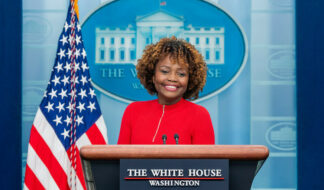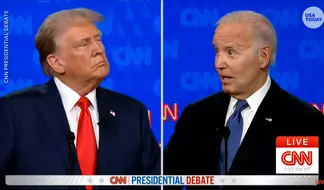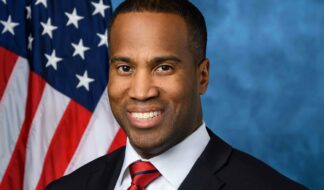Being in Washington, D.C. on Memorial to celebrate Black Gay Pride is one of life's contradictions. Thousands of out and proud African-American gay, lesbian, transgender, bisexual and queer Americans celebrate our pride, while surrounded by a sea of Americans celebrating veterans of all armed services who have given their lives for this country.
American flags are everywhere – on hats, lapel pins, streaming behind motorcycles – acknowledging all veterans – black, white, brown, the sons and daughters of immigrants, who in their service and deaths fought to protect and defend the freedoms that are the foundation of this country.
Every since Memorial Day was first observed on May 30, 1868, it has always been a day of unity – a time for Americans to come together in remembrance of our fallen heroes from wars past and present. Celebrities, dignitaries and politicians call on every American to honor and support the loved ones whose lives have been altered forever and to support these troops and their families.
It seems fitting and right for us to do this, but the contradiction continues to be that while acknowledging the sacrifices of our service men and women it is with the knowledge that the armed services have historically been a place where women, African Americans, Native Americans and others have suffered the most horrific examples of discrimination, sexism and homophobia.
I can remember, as a child, my father hanging the American flag out on our porch every Memorial day. At the traditional backyard family barbecue, cousins, uncles, friends of the family, my dad and even an aunt, would tell stories of discrimination in the barracks, of being welcomed as heroes in other countries and coming home to segregated bathrooms, of having the "enemy" raise the question of why they were serving a country that denied them equal rights because of the color of their skin (even some revolutionary black organizations said the same thing). Some of the stories were hard to listen to, but amidst the stories of discrimination and racism was a deep seated belief in the promise of America.
I can still hear James Boggs say that "despite all the atrocities" committed and condoned by this country he believed in the promise of America "that all men are created equal, that they are endowed by their Creator with certain unalienable rights that among these are life, liberty and the pursuit of happiness." And he, like the others gathered around that backyard barbeque, would not abdicate those rights just because the majority wanted to exclude them, felt they were less than them or tried to deny them these rights. Instead they would fight for, defend, protect and demand these rights because as Americans it was their birthright – despite "all the atrocities."
The justification for this treatment, which could also be applied to remarks against women in the military, was that there inclusion "would create an unacceptable risk to the high standards of morale, good order and discipline, and unit cohesion that are the essence of military capability." High standards based on Eurocentric, patriarchal standards where women, African Americans and other people of color had no place.
"Don't Ask, Don't Tell" is also based on the premise that an openly gay enlisted man or woman "would create an unacceptable risk to the high standards of morale, good order and discipline, and unit cohesion that are the essence of military capability." Unlike women or African Americans where appearance told so there was no need to ask, a gay service person can enlist under the radar of the military's ban on those who are not heterosexual. The policy prohibits anyone who "demonstrate(s) a propensity or intent to engage in homosexual acts" from serving in the armed forces of the United States and includes speaking about any relationships, marriages, community or family.
As an African American woman, I know that if I was fired – which is in fact what a discharge under DADT is, or, for that matter not hired (enlisting) despite being qualified, skilled and able to do the job just because I was a black woman, no one would deny that it was discrimination. But the same government that enforces the federal employment discrimination laws, protecting me as a civilian, could discharge me for talking about my partner, our relationship, my community.
Discrimination is discrimination. The law of the land must apply to every citizen – civilian or enlisted – it is our right.
In his remarks from the Capitol steps as part of the national Memorial Day concert, Retired General Colin Powell reflected upon the history of Memorial Day. He told how just weeks before the end of the Civil War, Abraham Lincoln pleaded with citizens to bind up the nation's wounds and care for the soldiers and their families. Powell, who crafted "Don't Ask, Don't Tell" said "..the mission of Memorial Day is to reach out and support all of the soldiers and their families who have sacrificed so much for us. Along with our prayers of remembrance it is our heartfelt privilege to salute those service men and women."
It is time to end the discriminatory practice of "Don't Ask, Don't Tell." It is time to let LGBTQ Americans serve openly and proudly in our military. LGBTQ service men and women believe in the promise of America and every day put their lives on the lines to defend those truths we hold to be self evident – despite all the atrocities.
In the spirit of Memorial Day, as we struggle for ways to heal America and bind up the nation's wounds, let's, as a nation, ask, tell and honor the service and sacrifice of LGBTQ service men and women and support their families. Let us serve in pride.
Topics:
Opinions









